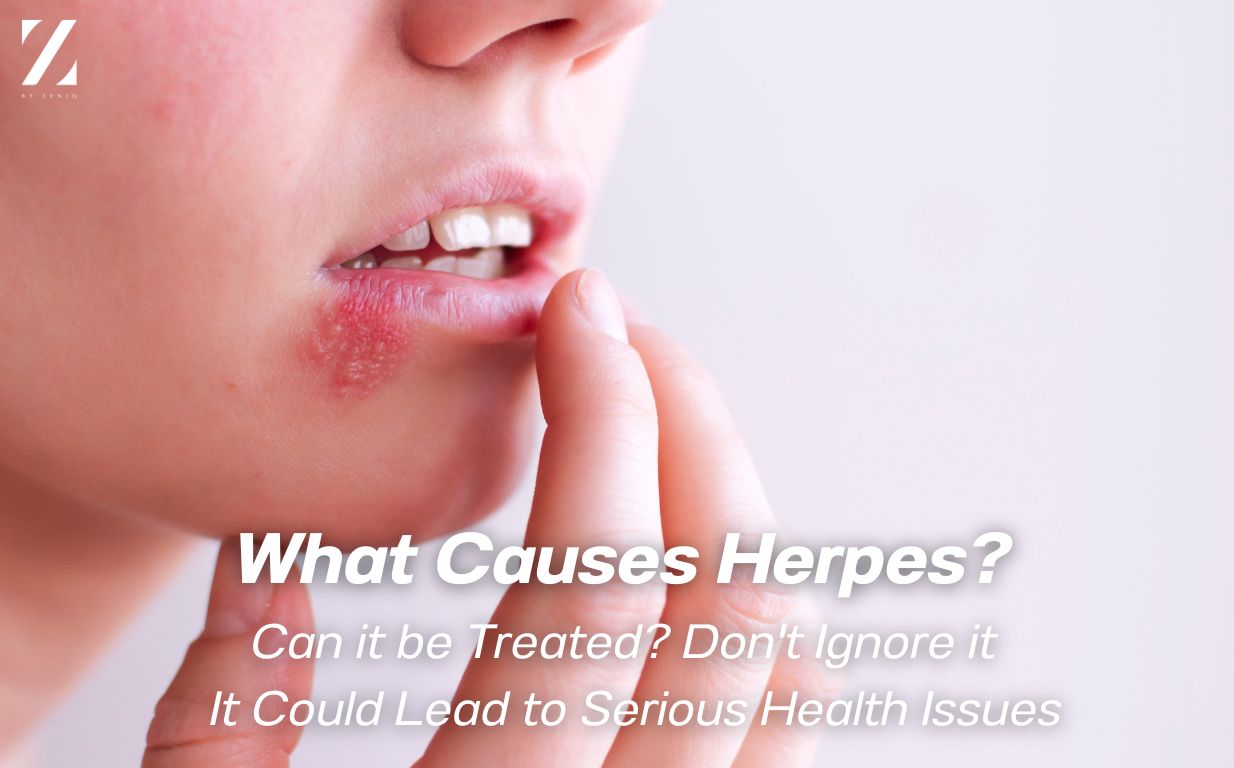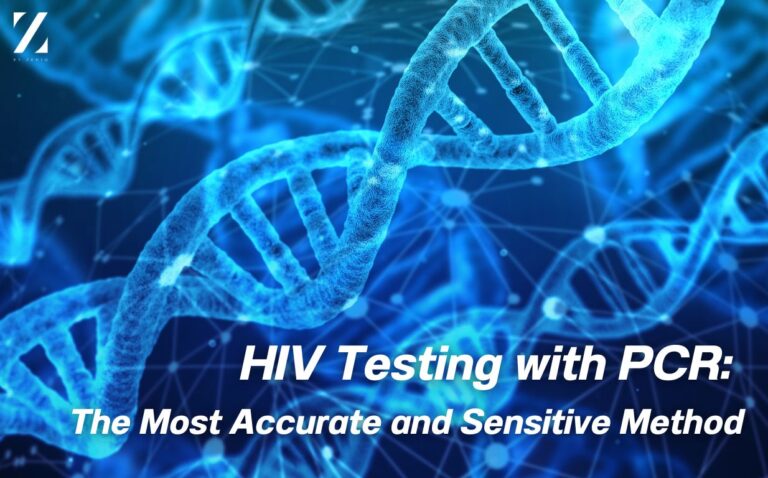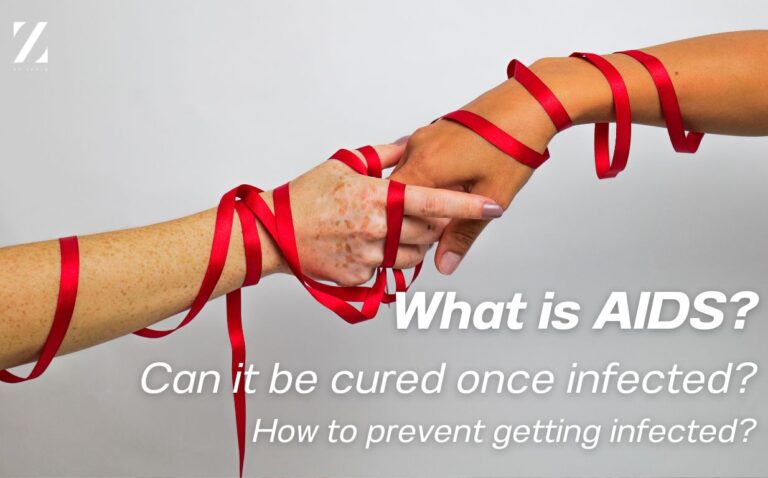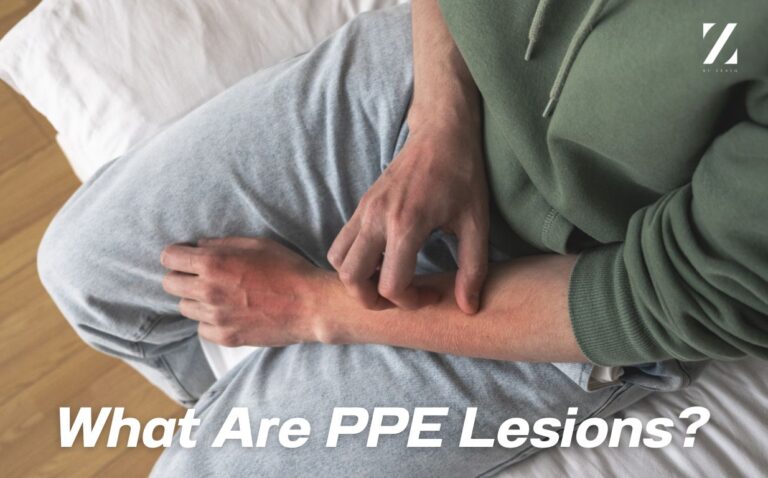Have you ever noticed that sometimes your lips develop small clear blisters, accompanied by a tingling or itchy sensation? These symptoms could be warning signs of “Herpes,” a common viral infection that is more easily spread than you might think, especially among teenagers and young adults. If left untreated, herpes can lead to serious health complications, such as bacterial superinfection or even increase the risk of contracting HIV.
What is Herpes?
Herpes simplex virus (HSV) infection, which is caused by either HSV-1 or HSV-2, leads to the formation of clear fluid-filled blisters and sores on the skin or mucous membranes, especially around the lips and genital area. Other symptoms may include itching, tingling, a burning sensation, and fever. The infection is usually transmitted through direct contact with the fluid from the blisters. Although treatments exist to alleviate symptoms, the virus remains in the body and may reactivate when the immune system weakens.
Types of Herpes
Herpes is classified into two main types based on the virus responsible:
- Herpes Simplex Virus Type 1 (HSV-1): This type primarily causes sores above the waist, such as on the lips, face, or skin, and is most often transmitted through direct contact.
- Herpes Simplex Virus Type 2 (HSV-2): This type causes sores below the waist, typically on the genitals, and is spread through sexual contact.
However, both HSV-1 and HSV-2 can cause sores on other parts of the body as well.
What Causes Herpes?
Herpes is caused by infection with HSV-1 and HSV-2 viruses.
HSV-1 Infection can occur through:
- Kissing or direct contact with an infected person’s lips
- Cheek kisses or touching the face where the virus is present
- Sharing personal items like cups, straws, lipsticks, or razors
- Oral sex, or contact with the genitals of an infected person using the mouth
HSV-2 Infection can occur through:
- Sexual intercourse, including vaginal, anal, or direct genital contact
- Oral sex, or contact with an infected person’s genital area using the mouth
- Skin-to-skin contact, even without the presence of visible sores
- Direct contact with a blister or sore
- Vertical transmission (from mother to baby) during pregnancy or childbirth
- Breastfeeding if the mother has sores on the nipple
Symptoms of Herpes
What does herpes look like? Herpes typically begins with a tingling or itching sensation at the site of infection, followed by the appearance of small clear blisters that group together on a red base. These blisters may be painful, itchy, and swollen, and will eventually break open, becoming sores that scab over and heal on their own.
Oral Herpes: Clear blisters may form on the lips, corners of the mouth, or inside the mouth. Genital Herpes: The virus has an incubation period of 2-14 days, during which clear blisters may appear on the genitals (external or internal), with a painful or burning sensation during urination, and possibly abnormal discharge.
General Symptoms: Fever, muscle aches, headache, and swollen lymph nodes may accompany the outbreak.
Female Genital Herpes: Women may experience a range of symptoms such as itching, burning, swelling, redness, and the appearance of clear blisters or sores on the genital area, vulva, vagina, or nearby areas like the groin or anus. Painful urination, abnormal discharge, and fever may also occur.
Male Genital Herpes: Men with genital herpes experience a burning sensation and discomfort, as if pricked by needles, in the genital area. Clear blisters or sores may appear on the penis, around the penis, or in nearby areas such as the anus or scrotum. Common symptoms include itching, swelling, painful urination, and fever.
Herpes vs. Shingles: Are They the Same?
Herpes and shingles both belong to the herpesvirus family but are caused by different viruses:
- Herpes is caused by HSV (Herpes Simplex Virus) and typically affects the lips or genitals.
- Shingles is caused by VZV (Varicella Zoster Virus), the same virus responsible for chickenpox, and usually appears along nerve pathways.
Although both conditions involve fluid-filled blisters, shingles is often more painful, with a stronger burning sensation, and typically involves fever. While herpes can be transmitted through direct contact with the blisters, shingles does not spread this way but can infect people who have never had chickenpox.
If unsure, consult a doctor for a proper diagnosis and treatment.
Is Herpes Dangerous? Are There Complications?
Herpes can cause more than just blisters on the lips or genitals. The virus can spread to other parts of the body, leading to serious complications such as:
- Eyes: The virus can infect the eyes, causing eye inflammation, which, if left untreated, may result in vision loss.
- Brain: The virus can attack nerve cells in the brain, leading to encephalitis, a life-threatening condition.
- Pregnancy: A herpes infection during pregnancy can cause severe complications for the baby, including the risk of a severe neonatal infection or premature birth.
How is Herpes Diagnosed?
If you suspect you have herpes, a doctor will diagnose the condition by:
- Taking a Medical History: The doctor will inquire about your symptoms, the location of the blisters, when the symptoms started, and any previous herpes outbreaks.
- Physical Examination: The doctor will assess the appearance of the blisters or sores to determine if they are herpes-related.
- Laboratory Tests: To confirm the diagnosis, tests such as:
- PCR Test: Directly detects the virus from a sample of blister fluid, offering a fast and accurate result.
- Viral Culture: Cultures a sample in the lab to check for virus growth.
- Blood Tests: Measure antibodies to detect past infections.
How is Herpes Treated?
While herpes cannot be fully cured, treatment can help manage the symptoms and reduce the frequency of outbreaks. Common treatments include:
- Antiviral Medications: These inhibit the virus’s ability to replicate, speeding up healing and reducing the chance of future outbreaks. Common antiviral medications include Acyclovir, Famciclovir, and Valacyclovir.
- Pain Relievers: Medications like Paracetamol and Ibuprofen help alleviate pain and discomfort.
- Anti-inflammatory Drugs: Non-steroidal anti-inflammatory drugs (NSAIDs) reduce swelling and pain.
- Topical Anesthetics: Creams or ointments like Benzocaine, L-lysine, and Docosanal can be applied directly to the sores to relieve pain and itching.
Can Herpes Recur After Treatment?
Once infected with herpes, the virus lies dormant in nerve cells and can reactivate, causing recurrent outbreaks. Triggers like stress, lack of sleep, weakened immunity, or other infections can cause the virus to resurface.
Self-Care Tips After Herpes Outbreak
Proper self-care helps speed up recovery and prevents recurrence:
- Get enough rest (7-8 hours of sleep daily).
- Eat a balanced diet with plenty of fruits, vegetables, whole grains, and protein to support immune function.
- Drink plenty of water (at least 8 glasses daily).
- Engage in light exercise, such as walking or yoga, to boost overall health.
- Manage stress through relaxation techniques like listening to music or meditation.
- Maintain good hygiene by washing hands frequently and cleaning affected areas with mild soap and water.
- Apply a cold compress to reduce swelling and pain.
How to Prevent Herpes
To reduce the risk of herpes infection and prevent spreading it to others:
- Avoid sharing personal items like cups, towels, and razors.
- Prevent direct contact with sores or blisters.
- Use condoms during sexual activity.
- Wash hands regularly, especially after touching areas that may be infected.
- Practice good personal hygiene by bathing regularly.
- Eat a nutritious diet to maintain a healthy immune system.
- Get adequate rest to help your body recover and stay strong.
Conclusion
Herpes is a highly contagious viral infection caused by HSV-1 or HSV-2, leading to painful blisters around the lips or genital area. While it cannot be cured, antiviral medications can help manage symptoms, and the risk of transmission can be minimized with proper precautions. If you suspect you have herpes, it is recommended to visit Z by Zeniq for expert diagnosis and treatment to ensure your safety and health.




